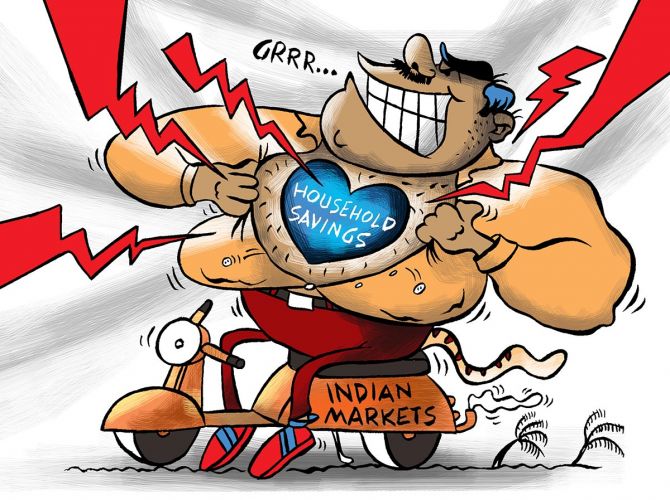'Given the worries about sluggish growth, rising interest rates and likely volatility, it's quite logical to infer that the SIP route could be the preferred way of investing.'

Sailesh Raj Bhan, deputy chief investment officer, equity, Nippon India Mutual Fund, in conversation with Sundar Sethuraman, says the financialisation of household savings into equities -- either directly or through MFs, portfolio management services -- has been unprecedented, lending strong support during global risk-off.
What were some of the unique things you experienced as a money manager last year?
The resilience of Indian markets has been quite remarkable as markets scaled record-high levels amidst heightened global volatility.
The global risk-off phase led to sharp outflows from global and emerging market equities.
Indian markets also weathered one of the sharpest phases of selling by foreign investors.
They have rebound to scale fresh peaks, notwithstanding some weakness mid-year.
The financialisation of household savings into equities -- directly or through vehicles like mutual funds, portfolio management services -- has been unprecedented, lending strong support during global risk-off.
How are we placed in terms of valuation, earnings growth, and economic outlook? Do you see earnings expectations being met?
As we enter 2023, we see an environment where both inflation and growth might be slowing.
India most likely will emerge again as the fastest-growing economy with perhaps limited macro volatility.
Yet, near-term global uncertainties are unlikely to wither soon and therefore, it would be wise to have moderate return expectations in the near term.
Earnings can remain challenging for some time as global growth weakens further and local economic conditions return to normal trends.
2022 saw a moderation in equity flows and investor growth. Will moderation persist?
Domestic investors have witnessed stellar equity returns over the past few years and it's quite understandable that investors would have made some reallocation and altered their mode of participation.
For instance, over the past 11 months, it is estimated that SIP (systematic investment plan) inflows increased by over 30 per cent with over 60 million live SIP accounts.
Given the worries about sluggish growth, rising interest rates and likely volatility, it's quite logical to infer that the systematic route could be the preferred way of investing.
The broader market has underperformed, especially small-caps.
There are many interesting themes which could potentially benefit from domestic growth possibilities. Some key ones include:
Banks: India's combined debt of corporates and households is very low, providing tremendous scope for leverage-driven domestic growth.
With a growing economy and rising credit penetration, bank credit may grow at a faster clip than nominal gross domestic product growth.
Formalisation and urbanisation: India's urbanisation is quite low by global standards and is witnessing tremendous acceleration.
This represents various opportunities, including housing and premiumisation across consumer categories like retail and leisure.
Manufacturing: There have been various tax incentives, both in the form of direct taxes (corporate taxes, production-linked incentive benefits) and indirect taxes (goods and services tax) available to local manufacturers.
These, along with China Plus One (looking at supply alternatives to China), have provided the right enablers for potentially strong manufacturing growth in the years ahead.
While some segments have rerated, given the market rally, we believe longer-term opportunities remain.
Which sectors could do well in 2023 and why?
Given domestic growth, fundamentals are much better placed than others.
India-centric themes like banking, non-lending financials, travel and tourism, and engineering appear interesting.
Some mean reversion may be possible across areas like health care, staples, and information technology.
How's the risk/reward for equity versus debt?
I think it is important for all of us not to be distracted by the current narratives and focus instead on the risk/return possibilities of each asset class, along with one's risk appetite and time horizon while deciding on allocations.
Given the context of relatively higher interest rates and likely global growth slowdown, the risk/reward for both asset classes appears to be evenly balanced.
A market correction can create potential opportunities for long-term equity investors.
Should one look at international exposure as markets like the US and China play catch-up?
International exposure helps in diversification and lends better balance to the portfolio, given the lower correlation with domestic markets.
They also offer the opportunity to participate in geographies and themes that are on a different scale and stage of development.
From that perspective, developed markets and other fast-growing/EM countries offer interesting possibilities.
International exposure should be viewed from the prism of diversification and the relative uniqueness they offer to portfolio allocation.
Disclaimer: This article is meant for information purposes only. This article and information do not constitute a distribution, an endorsement, an investment advice, an offer to buy or sell or the solicitation of an offer to buy or sell any schemes or any other financial products/investment products to influence the opinion or behaviour of the investors/recipients.
Any use of the information/any investment and investment-related decisions of the investors/recipients are at their sole discretion and risk. Any advice herein is made on a general basis and does not take into account the specific investment objectives of the specific person or group of persons. Opinions expressed herein are subject to change without notice.












 © 2025
© 2025